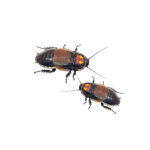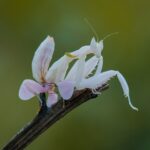

Phyllocrania paradoxa
15,00€
Experience the magic of nature with the Phantom Mantis! Her exceptional camouflage and captivating behavior make her a living treasure. Make it part of your world today! 🌿✨
Sold out
This product is currently sold out.
No worries! Enter your email, and we'll let you know as soon as it's back in stock.
Technical sheet of the Phyllocrania paradoxa (Phantom Mantis)
Scientific Name: Phyllocrania paradoxa
Common Name: Ghost mantis
Taxonomic Classification:
Kingdom: Animalia
Phylum: Arthropoda
Class: Insecta
Order: Mantodea
Family: Hymenopodidae
Genus: Phyllocrania
Species: P. paradoxa
Physical Description:
The Phyllocrania paradoxa, also known as the ghost mantis, has an extraordinarily mimetic appearance, perfectly imitating dry or green leaves.
Its body is elongated and flat, with a coloration that varies from brown to green, mimicking the appearance of leaves.
Adults can reach lengths of up to 5 to 7 centimeters.
The forelegs are adapted for capturing prey and resemble miniature leaves, allowing them to camouflage even better in their environment.
Habitat and Distribution:
It is primarily found in tropical Africa and some areas of Madagascar.
It prefers habitats with dense vegetation, such as tropical forests and jungles, where it can easily camouflage among the leaves and wait for its prey.
Behavior and Feeding:
They are carnivorous predators that mainly feed on other insects.
They use their camouflage to stalk their prey, remaining motionless and waiting for them to come close enough to be captured with their adapted forelegs.
They are known for their aggressive behavior during feeding and reproduction.
Life Cycle and Reproduction:
They undergo an incomplete life cycle, with three stages: egg, nymph, and adult.
Females deposit their eggs in oothecae, sac-like structures containing multiple eggs.
Nymphs emerge from the eggs and go through several molts before reaching sexual maturity.
Reproduction usually occurs during the rainy season when environmental conditions are more favorable.
Related products
Caribena versicolor
Sold out
Hymenopus coronatus
Sold out
Peruphasma schultei
Sold out
Trichorhina tomentosa
there is stock
Blaptica Dubia
there is stock
Achrioptera manga (fallax)
Sold out
Armadillidium klugii
there is stock















